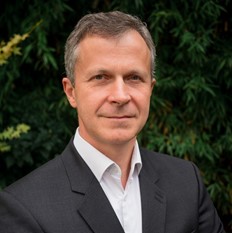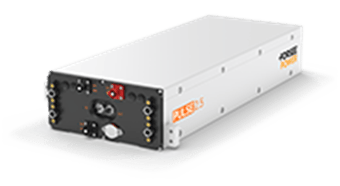
In October 2021, Ballard and Forsee announced a long-term strategic partnership to develop and commercialize integrated fuel cell and battery solutions for heavy duty vehicles. In today’s conversation, Christophe Gurtner, Chairman and CEO, Forsee Power, discusses the Ballard partnership, why batteries and fuel cells are both essential to the zero-emission transition, and more.
Christophe, can you tell us a bit about yourself? What is your area of expertise and what are you passionate about?

Creating batteries for mobility for tomorrow's world is, of course, one of my big passions. At Forsee Power, we make battery systems for heavy vehicles, such as buses, trucks, boats, trains, and for light vehicles, such as scooters, three-wheelers, and light four-wheelers. We’ve been doing this for 10 years now.
Forsee Power is a company that's built its reputation on battery electric power. Why did you now decide to partner with Ballard, a fuel cell manufacturer?
Because these two worlds are very complementary. Both batteries and fuel cells are necessary. Batteries are especially good for short distances and fuel cells are a very good solution for long distances. This means that these two worlds need to work closely together. Once we reach cost efficiency and total efficiency, there won’t be a need for any subsidy.
 Double deck bus by Wrightbus powered by Forsee Power’s PULSE 2.5 modules
Double deck bus by Wrightbus powered by Forsee Power’s PULSE 2.5 modules
How long will it take to get to that zero-subsidy plateau?
It’s hard to say for sure, but I believe that probably 10 years from now we'll be there, and 10 years will pass very fast.
What are some of the challenges that need to be overcome in North America for the widespread adoption of fuel cell powered battery electric vehicles?
I think there are two challenges. The first challenge is infrastructure. In reality, it’s one big issue—it's an issue for just batteries, and an even bigger one for fuel cells. So this is where governments have a key role to play. The second challenge is in regard to the vehicle itself. The whole fuel cell system works well, so now the question of total cost of ownership is paramount. Systems need to become cheaper and last as long as legacy technologies.
Can you tell us about the scope of Forsee Power’s collaboration with Ballard?
In a fuel cell system, the fuel cell and battery work together and both need to be optimized. On top of that, optimizing the DC converter which fits into the whole system, and the energy management system is essential. So we are working together with Ballard on bringing a new optimized system to market which will, of course, be advantageous to end-users.
 Foresee Power’s 2.5 kWh high-power extra-slim module for the fast-charging option
Foresee Power’s 2.5 kWh high-power extra-slim module for the fast-charging option
Is that something that Forsee Power provides engineering services for?
Our focus is purely on battery power. One of the nice things about the collaboration with Ballard is that Ballard is now able to do the fuel cell integration. So of course it's making the job much easier for us and for Ballard.
Any final thoughts you’d like to share with Ballard’s readers?
What we see worldwide, is that the level of knowledge our customers have is very limited. As an industry, we need to do a lot of education to explain that it's not just a question of price or a nice-looking product. It's a question of performance, safety, and lifetime cost, and to achieve that is very difficult. It's complex work and you need to have very highly skilled partners with advanced technology. Both Ballard and Forsee Power have been in the market for a very long time and we've proven over the years that what we do is working and it’s safe.